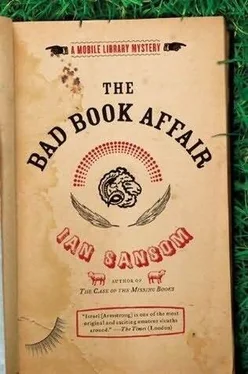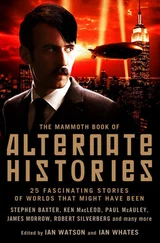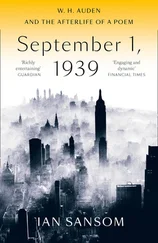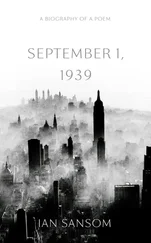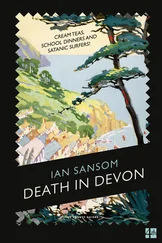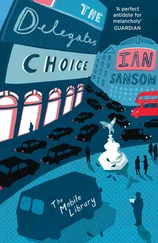“Here, do me some more whitewash while ye’re there, would you?” she called over to him.
“What?”
“Hydrated lime. Salt. In the cans in the barrow there. Plus water.”
“All right, all right,” said Israel.
“But watch your hands,” said George.
“OK!” said Israel.
“And don’t rub your eyes,” shouted George.
“Ahh!” said Israel, who’d rubbed his eyes.
Having washed his hands and rinsed his eyes, Israel started adding water and lime and salt into the old cut-down oil drum on the wheelbarrow.
“How much water?” he called across the yard to George.
“About two gallons,” George called back.
Israel didn’t want to ask how much was two gallons, so he hosed what he thought looked like two gallons into the oil drum and wheeled the barrow unsteadily back over, oil drum filled to the brim. He was trying to remember from school how many pints were in a gallon. Was it twelve? Or three? Or thirty-six? Or was that inches in a yard? He’d grown up metric in north London: gallons were as foreign to him as was bitter Sumatran coffee to the coffee crowd in Zelda’s Café.
And as he wobbled back over toward George, for a moment it felt good to both of them to be working together, to have a purpose. It reminded George of her parents: in harmony and in tandem. Each knowing what the other needed and taking care to provide it. Helpmeets. Partners. Farmers. And Israel enjoyed doing something for George, because it felt as though he was not alone, as though his life was in parallel with another’s. For a moment.
George paused from slopping on the whitewash, turned, looked into the oil drum.
“What’s that?” she said.
“It’s the whitewash,” asked Israel.
“That’s not whitewash,” said George. “I said two gallons of water.”
“That’s about…two gallons, isn’t it?”
“How many gallons in an oil drum?” demanded George.
“I don’t know. I’ve never-”
“Fifty-five!” said George. “And this is a half-drum, so-”
“About twenty-seven gallons?” said Israel.
“You’re an idiot, Armstrong,” said George.
“Sorry,” said Israel.
“Don’t say sorry for being an idiot!” said George. “Say sorry for wasting all that lime and-”
“Sorry,” said Israel.
“Stop saying sorry!”
“But you just said-”
“I don’t care what I just said!”
“Well, I-”
“Leave it. I’ll do it myself,” said George, grabbing one of the handles of the wheelbarrow.
“No. No, I’ll do it,” said Israel, grabbing the other. “It’s fine, I just didn’t know how-”
“Leave it!” said George, pulling at the handle. “I’m doing it.”
“Let me help,” said Israel, yanking back. “I want to-”
And it tipped, of course, the oil drum with its gallons of whitewash, tipped slowly and inexorably toward Israel, first splashing and then toppling, the murky white water coming over him like a torrent, and the drum rolling and shrieking across the yard like a wounded animal, the whitewash flooding in its wake. Israel staggered back, soaked, George’s eyes riveted on him.
“Sorry!” he said, not sure how she’d take it.
“Sorry,” she said.
“Yes. Sorry,” said Israel.
“All that waste,” she said, staring as the whitewash soaked into the concrete.
“Sorry,” repeated Israel.
“Just go,” she said quietly.
“I’ll help-”
“Just go away, Armstrong.”
“No, it’s fine,” said Israel. “I’ll-”
“Leave me alone!” screamed George suddenly.
“But-”
“Go!” she yelled. “Go! Away!”
So Israel went. He went back into the chicken coop and shut the door. And George set about putting things right in the yard.
And once again absolutely nothing had passed between them.
The lane from the Devines’ to Pearce Pyper’s was one of the most beautiful places Israel knew around Tumdrum, a place so beautiful in fact that it was almost enough to restore his proverbial and habitual and today very particular low Sunday spirits. But not quite. An overgrown, winding, one-way gravel track suitable for single traffic only, and hemmed with high hedges and tall trees, the lane made him think of Gloria and England and of long lacy and weepy Victorian and Edwardian narrative poems. It was a route he walked every Sunday on his way to read with Pearce, and it usually had an effect of uplift. The fields to either side of the lane sprang alive with rabbits and hares and the sound of blackbirds, and then suddenly, with a parting of the trees, there was the arrival at Pearce’s, which was always like stumbling upon a previously undiscovered ancient Aztec ruin, what with Pearce’s eccentric sculptures flanking the driveway and scattered throughout the grounds-the chunky painted concrete, and the driftwood things, and the totem poles made of old railway sleepers-and the avenue of trees extravagantly pleached, espaliered, and cordoned, and then finally the house itself, Pearce’s mad, grand baronial-cum-Corbusier home.
Israel had spent the afternoon tidying his coop, avoiding George, who had also been avoiding him, and he stood now-confused and chastened, but also at least a little cheered and chivvied by nature-and yanked at Pearce’s big chain doorbell, which rang, as big chain doorbells always ring, ominously.
Pearce’s housekeeper, Joan, answered the door. She was not a woman who wasted her words; she was a woman who looked like she permed her own hair. Unwillingly.
“Yes?” she said. Up until recently Israel had come every Sunday to see Pearce, and Joan had always greeted him with the same thin, suspicious “Yes?” as though anything more would be an invitation to unwonted intimacy.
“I’m here to see Pearce,” he said.
“He’s not well.”
“Oh dear,” said Israel. “Shall I call back at a more convenient time?”
“There’ll be no more convenient time,” said Joan, and she turned her back on Israel and made off through the house.
Israel closed the big oak door behind him and hurried to catch up with her. The house, always huge, always echoing, but usually somehow full and present with energy, some how felt today as though it had been drained of life, like an abandoned theater, as though the theatrical impresario had already left, packing up in a hurry and moving on to his new home. It felt like Kane’s Xanadu: a vast, complex, empty puzzle.
Usually on his Sunday visits Israel would sit in the drawing room with Pearce, who would insist on plying Israel with wine-“Into the old sluicery,” he would say, and into the old sluicery it would be, and “Don’t be such a silly prawn,” he would say, when Israel refused another glass, or “Tosh!” he would say to anything he disagreed with, which was most things-and he taught Israel how to open bottles of champagne with nutcrackers, and how to decant, and the difference between a good Lafite and a fine Latour and an acceptable Margaux. Pearce’s hand did not stint, nor in old age had his appetites wearied: just a couple of months ago, during one of their Sunday afternoon sessions, they’d polished off between them a nice half bottle of Sancerre, and a pinot noir from the Salgesch, and a pinot noir from Yvorne, all the while discussing the meaning of life, and art, and the pros and cons of the Futurist Manifesto, and the war in Iraq.
Over time, the arrangement had become more formalized, and Israel would arrive and read from one of Pearce’s favorite books-Madame Bovary (“Incomparable!” Pearce would exclaim. “Sans pareil!”) or some George Eliot (“The best-looking English novelist”) or Dickens (“The great farceur!”)-and then they would drink and eat Madeira cake. They had become their own miniature literary salon, a twenty-nine-year-old-soon-to-be-thirty-year-old mobile librarian, and an eighty-two-year-old Anglo-Irish aesthete. Israel had found it a most curious and refreshing experience, reading out loud to Pearce, the complete opposite of reading out loud to the children at Tumdrum Primary, where the real challenge was keeping order and hanging on to his dignity. Reading to the elderly Pearce was for Israel like becoming a child again, being able to become absorbed and enfolded in a book. Israel found that, as he read, his mind would often wander in a kind of dreaming concentration, and he’d find himself somehow with Madame Bovary, romanticizing, or with Magwitch swimming with his heavy chains, or Maggie Tulliver cerebrating. It had something to do with the rhythm of the language: he would find himself breathing with the books.
Читать дальше
Конец ознакомительного отрывка
Купить книгу
